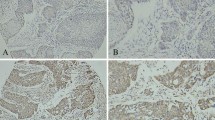Abstract
Purpose
The purpose of this study was to analyze the prognostic value of vascular endothelial growth factor (VEGF) in patients with stage III rectal cancer treated with 30-Gy/10-fraction (f) preoperative radiotherapy and radical surgery.
Methods
One hundred and sixteen patients with clinical stage III rectal cancer were studied. All patients underwent radical surgery after 30-Gy/10-f preoperative radiotherapy. Immunohistochemical examination of VEGF was performed on the resected tumor specimen. An immunohistochemical score established from the extension and intensity of the markers was used for analysis. The log-rank test and proportional hazards regression analysis were used to calculate the probability that this biomarker was associated with patient outcomes.
Results
The expression of VEGF was identified among 74.1 % (86 of 116) of patients. We found an increased incidence of distant metastasis (19.8 vs. 3.3 %, p = 0.039) and a decreased 3-year disease-free survival rate (96.7 % vs. 72.7 %, p = 0.003) in patients with positive VEGF staining. In multivariate survival analysis, positive VEGF staining (hazard ratio (HR) = 9.364, 95 % confidence interval (CI) 1.298–71.519, p = 0.027) and ypN+ stage (HR = 2.714, 95 % CI 1.419–3.331, p = 0.000) were the independent prognostic factors for disease-free survival. Subgroup analyses showed that the expression of VEGF was significantly associated with increased distant metastasis rate and decreased DFS in patients with ypN+ stage.
Conclusions
VEGF expression may have potential value for predicting distant metastasis and disease-free survival in stage III rectal cancer after 30-Gy/10-f preoperative radiotherapy. Inhibition of VEGF in combination with radiotherapy may improve the patient outcomes.


Similar content being viewed by others
References
Jemal A et al (2009) Cancer statistics, 2009. CA Cancer J Clin 59(4):225–249
Li M, Gu J (2005) Changing patterns of colorectal cancer in China over a period of 20 years. World J Gastroenterol 11(30):4685–4688
Glynne-Jones R et al (2007) The multidisciplinary management of gastrointestinal cancer. Multimodal treatment of rectal cancer. Best Pract Res Clin Gastroenterol 21(6):1049–1070
Sebag-Montefiore D, Bujko K, Valentini V (2009) Rectal cancer multidisciplinary management: evidences and future landscape. Radiother Oncol 92(2):145–147
Bisceglia G et al (2010) Effectiveness of neoadjuvant radiotherapy in the treatment of locally advanced rectal cancer: a single-center experience in 263 patients. Dig Surg 27(3):217–223
Valentini V et al (2009) Multidisciplinary rectal cancer management: 2nd European Rectal Cancer Consensus Conference (EURECA-CC2). Radiother Oncol 92(2):148–163
Peeters KC et al (2007) The TME trial after a median follow-up of 6 years: increased local control but no survival benefit in irradiated patients with resectable rectal carcinoma. Ann Surg 246(5):693–701
Bosset JF et al (2006) Chemotherapy with preoperative radiotherapy in rectal cancer. N Engl J Med 355(11):1114–1123
Sauer R et al (2004) Preoperative versus postoperative chemoradiotherapy for rectal cancer. N Engl J Med 351(17):1731–1740
Sebag-Montefiore D et al (2009) Preoperative radiotherapy versus selective postoperative chemoradiotherapy in patients with rectal cancer (MRC CR07 and NCIC-CTG C016): a multicentre, randomised trial. Lancet 373(9666):811–820
Folkman J (1992) The role of angiogenesis in tumor growth. Semin Cancer Biol 3(2):65–71
Ferrara N, Gerber HP, LeCouter J (2003) The biology of VEGF and its receptors. Nat Med 9(6):669–676
Campa D et al (2010) A gene-wide investigation on polymorphisms in the taste receptor 2R14 (TAS2R14) and susceptibility to colorectal cancer. BMC Med Genet 11:88
Camma C et al (2000) Preoperative radiotherapy for resectable rectal cancer: a meta-analysis. JAMA 284(8):1008–1015
Heald RJ, Ryall RD (1986) Recurrence and survival after total mesorectal excision for rectal cancer. Lancet 1(8496):1479–1482
Saito H et al (1998) Relationship between the expression of vascular endothelial growth factor and the density of dendritic cells in gastric adenocarcinoma tissue. Br J Cancer 78(12):1573–1577
Nieder C et al (2007) Radiation therapy plus angiogenesis inhibition with bevacizumab: rationale and initial experience. Rev Recent Clin Trials 2(3):163–168
Galizia G et al (2004) Determination of molecular marker expression can predict clinical outcome in colon carcinomas. Clin Cancer Res 10(10):3490–3499
Roskoski R Jr (2007) Vascular endothelial growth factor (VEGF) signaling in tumor progression. Crit Rev Oncol Hematol 62(3):179–213
Gupta VK et al (2002) Vascular endothelial growth factor enhances endothelial cell survival and tumor radioresistance. Cancer J 8(1):47–54
Gorski DH et al (1999) Blockage of the vascular endothelial growth factor stress response increases the antitumor effects of ionizing radiation. Cancer Res 59(14):3374–3378
Giatromanolaki A, Sivridis E, Koukourakis MI (2006) Angiogenesis in colorectal cancer: prognostic and therapeutic implications. Am J Clin Oncol 29(4):408–417
Giralt J et al (2006) Prognostic significance of vascular endothelial growth factor and cyclooxygenase-2 in patients with rectal cancer treated with preoperative radiotherapy. Oncology 71(5–6):312–319
Nozue M, Isaka N, Fukao K (2001) Over-expression of vascular endothelial growth factor after preoperative radiation therapy for rectal cancer. Oncol Rep 8(6):1247–1249
Yancopoulos GD et al (2000) Vascular-specific growth factors and blood vessel formation. Nature 407(6801):242–248
Winkler F et al (2004) Kinetics of vascular normalization by VEGFR2 blockade governs brain tumor response to radiation: role of oxygenation, angiopoietin-1, and matrix metalloproteinases. Cancer Cell 6(6):553–563
Li J et al (2005) Angiogenesis and radiation response modulation after vascular endothelial growth factor receptor-2 (VEGFR2) blockade. Int J Radiat Oncol Biol Phys 62(5):1477–1485
Kozin SV et al (2001) Vascular endothelial growth factor receptor-2-blocking antibody potentiates radiation-induced long-term control of human tumor xenografts. Cancer Res 61(1):39–44
Lee CG et al (2000) Anti-vascular endothelial growth factor treatment augments tumor radiation response under normoxic or hypoxic conditions. Cancer Res 60(19):5565–5570
Author information
Authors and Affiliations
Corresponding author
Additional information
Yifan Peng and Lin Wang contributed equally to this article.
Rights and permissions
About this article
Cite this article
Peng, Y., Wang, L., Du, C. et al. Expression of vascular endothelial growth factor can predict distant metastasis and disease-free survival for clinical stage III rectal cancer following 30-Gy/10-f preoperative radiotherapy. Int J Colorectal Dis 27, 1555–1560 (2012). https://doi.org/10.1007/s00384-012-1485-8
Accepted:
Published:
Issue Date:
DOI: https://doi.org/10.1007/s00384-012-1485-8




